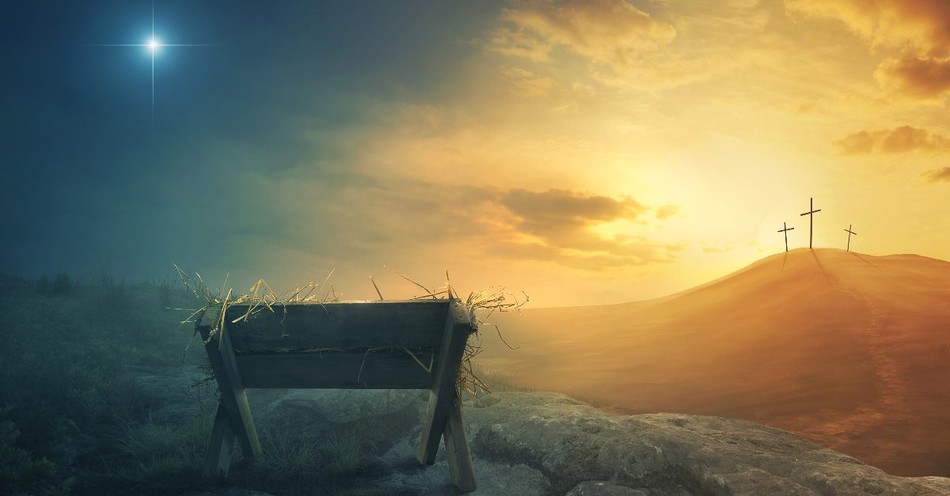Have you ever pondered the truth that all truly good things, including Christmas, are mostly about waiting?
1. In the Beginning
The story of Christmas goes back to the Garden of Eden. The day Adam and Eve partook of the fruit of the tree of the knowledge of good and evil, God didn’t panic. Heaven didn’t go on red alert. God had seen this coming long before creation.
God searched for Adam and Eve, found them, sacrificed a pair of animals to clothe them, and went on record foretelling of a coming Messiah who would crush Satan’s head and bring deliverance to God’s people. And then, with tears running down His cheeks, God dismissed Adam and Eve from the garden.
2. Calvary’s Rugged Tree
I can almost see God standing by the forbidden tree, knowing that one day He, Himself, would return to earth, disguised as a human baby (the First Christmas), to grow up and let Himself be nailed to a tree, bearing all the evil and sin and wickedness of this world in His own body (Good Friday).
And after doing so, in the aftermath of Satan’s “triumph,” to turn around and crush him and rise from the dead to offer new, eternal life to all who believe (Easter Sunday).
God stooped to join His human family on earth so that one day we might be lifted up to join His family in heaven. God was born as the seed of woman that we might be adopted as sons and daughters of God. God became sin that we might take on His righteousness. By His wounds, we were healed.
Yet this promise of the coming Messiah was made thousands of years before Jesus Christ’s birth.
If we miss this, we miss the whole point of Christmas. Christmas is about an incredible promise God made to us that took thousands of years to be fulfilled.
It’s about a promise, and it’s about waiting a very, very long time.
3. Bethlehem’s Birth
Don’t get me wrong. At precisely the right time, Jesus Christ was born. God added more than 60 prophecies to His original one, telling His people precisely when, where, and why His Son, Jesus the Messiah, would be born.
The miracle isn’t that a handful of shepherds and wise men came to worship the newborn King of kings, but that the whole world didn’t flock to Bethlehem to greet His entrance into the world.
Not one member of the Jewish ruling council, not one rabbi, not one priest, took the time to walk an hour and a half from Jerusalem to Bethlehem to see the Word become flesh, to see God dwelling again with humanity.
4. Where Was Everyone?
At the end of the Old Testament, God makes this sobering declaration: “I will search with lanterns in Jerusalem’s darkest corners to punish those who sit complacent in their sins. They think the Lord will do nothing to them, either good or bad” (Zephaniah 1:12, NLT).
Yet in the end, not even the high priest himself welcomed baby Jesus into the world.
The high priest probably didn’t believe God was going to do anything, here on earth, either good or bad, to change the status quo. After all, God hadn’t done anything, as far as he could tell, for centuries.
The heavens were silent. The prophets spoke no more. No one had seen a miracle since the days of the Maccabees. For all practical purposes, God had disappeared.
Oh, many Jewish people back then were devout. Don’t get me wrong. But many were Jewish in name only.
John the apostle tells us, “He came to his own people, and even they rejected him. But to all who believed him and accepted him, he gave the right to become children of God” (John 1:11-12, NLT).
Who were some of those who received Jesus, and believed in His name?
In Luke 2, we have the famous Christmas story about how Joseph and Mary went up from Nazareth to Bethlehem, the City of David, when Caesar Augustus issued a decree that a census should be taken of the entire Roman Empire.
If you keep reading that chapter, we’re told that 40 days after Jesus’ birth, Joseph and Mary went to Jerusalem to consecrate Jesus. There they meet an old man, Simeon, who had received God’s promise that he, himself, would see the promised Messiah, the Christ child, in his own lifetime.
The Holy Spirit was upon Simeon. He was filled with God. Still, he longed to see the Christ child. The day it happened, he took Jesus in his arms. I can imagine him laughing, looking, wondering:
God, is that you? It is! You’ve come! You’ve come! At last! This baby is the Savior of all humanity, Jew and Gentile alike. Now I can die in peace.
Then Simeon blessed them and said to Mary, his mother: “This child is destined to cause the falling and rising of many in Israel, and to be a sign that will be spoken against, so that the thoughts of many hearts will be revealed. And a sword will pierce your own soul too” (Luke 22:34-35).
Against all odds, at the end of Simeon’s life, God had kept His promise.
That same hour, Joseph and Mary meet Simeon’s dear old friend, Anna, a prophetess, who took the infant in her arms, praised God and started telling everyone that the long-awaited Messiah had been brought to the Temple to be dedicated.
Like Simeon, Anna had waited such a long time. Yet.
5. Waiting after the Cross
Interestingly, it appears Jesus never told His disciples to “wait” until after His resurrection. Then, what did He tell them to wait for? For the Holy Spirit, who would come on the day of Pentecost.
The Apostle Paul didn’t talk about “waiting” much either. But each time he did, he always talked about waiting in hope of Jesus Christ’s return. How? Each time, Paul makes a point of saying that the Holy Spirit is the one who enables us to wait.
Waiting doesn’t come naturally. As my good friend Mike Goertz used to remind me, “We hate to wait.” To wait for Jesus Christ’s return, we need the Holy Spirit’s supernatural power.
If you or I quench the Holy Spirit, if we grieve the Holy Spirit, if we tune Him out of our lives...we’ll stop waiting.
When we stop waiting, we start calling God a liar. “God, I don’t care how incredible it was that Jesus came the first time. I don’t care that You sent the Holy Spirit. It’s been 2,000 years. I’m giving up. I’m doing my own thing.”
Yet, anything worth having is worth waiting for. Anybody can walk down the aisle, but it takes a lifetime to produce a good marriage. Likewise, we can’t be holy in a hurry. There are no shortcuts to spiritual maturity. As my good friend John Van Diest told me, most of our faith is patience, waiting.
But it’s so hard to wait, isn’t it?
That’s why we need the Holy Spirit’s supernatural power at work in our hearts. Only then can our waiting produce good fruit that blesses us and that blesses many others.
For further reading:
What Happened on the First Christmas?
How Was it the Right Time for Jesus’ Life on Earth?
How Does God Make Everything Beautiful in its Own Time?
What Does it Mean That Jesus Is the Second Adam?
Photo Credit: ©iStock/Getty Images Plus/kevron2001





